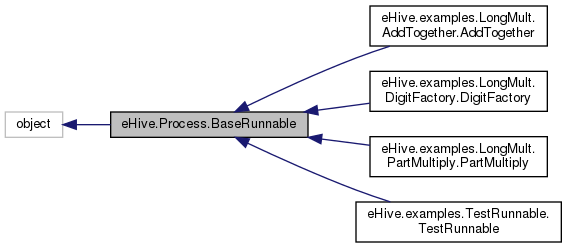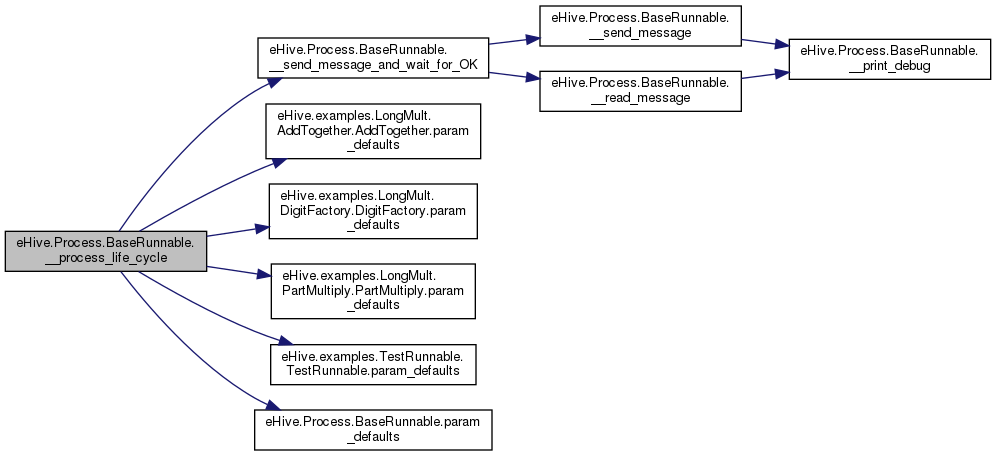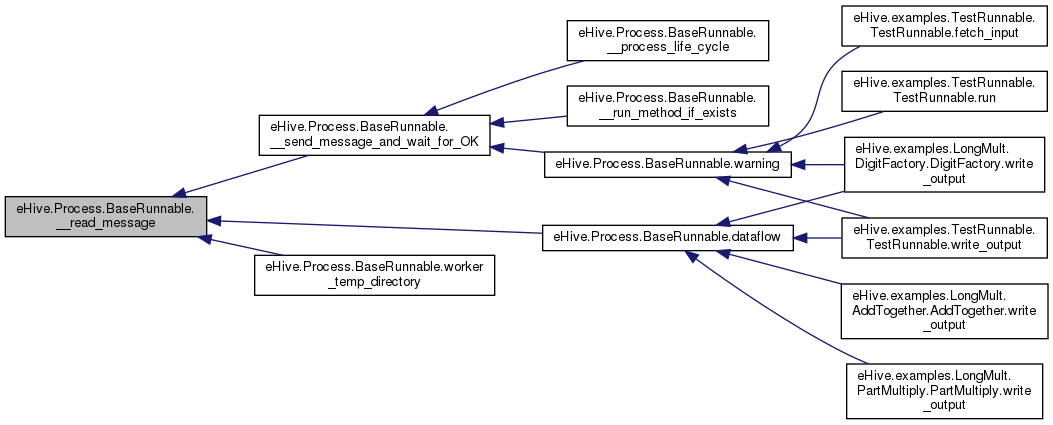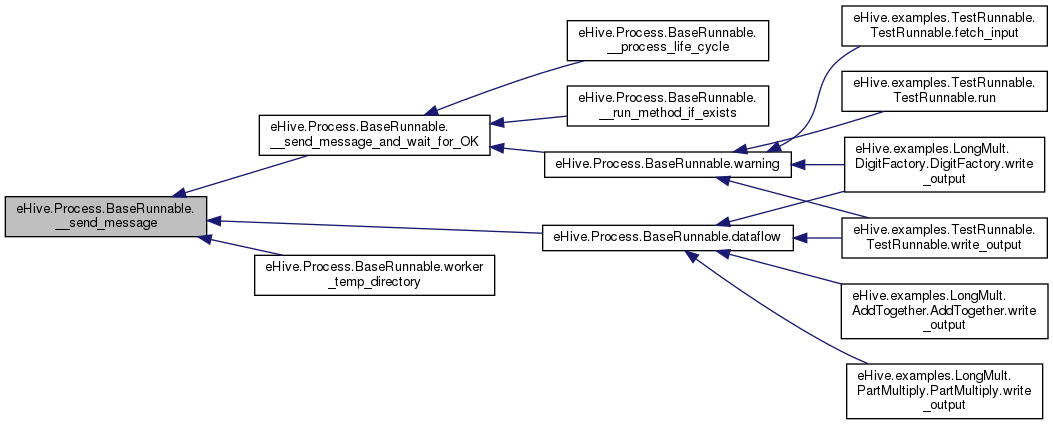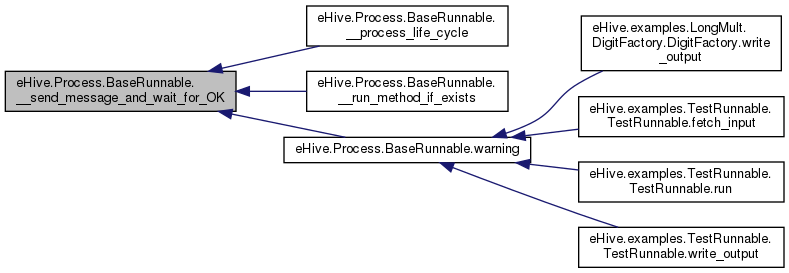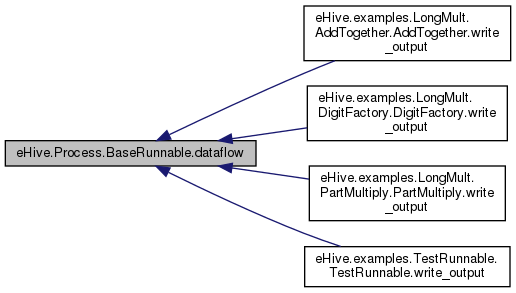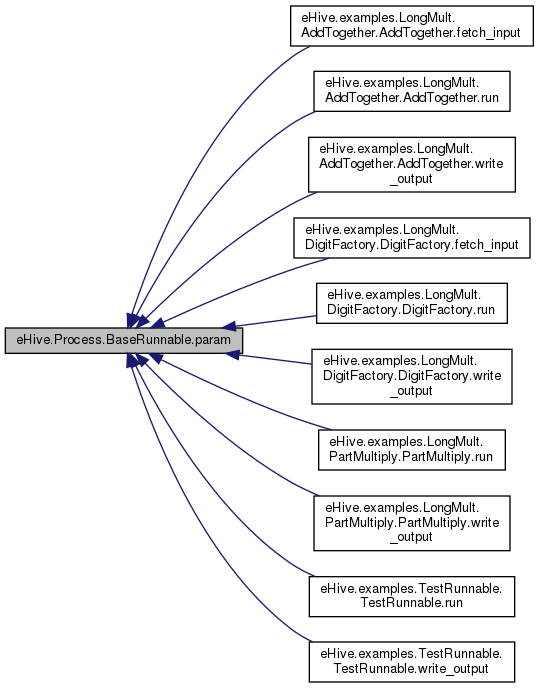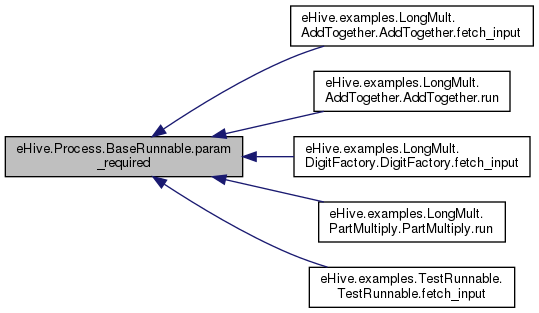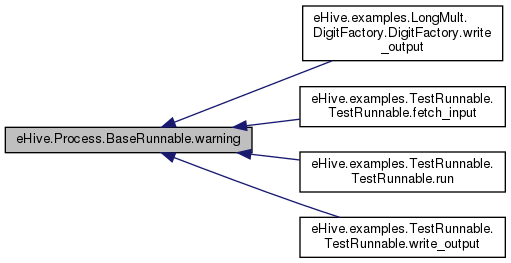This is the counterpart of GuestProcess. More...
 Inheritance diagram for eHive.Process.BaseRunnable:
Inheritance diagram for eHive.Process.BaseRunnable:Public Member Functions | |
| def | __init__ (self, read_fileno, write_fileno, debug) |
| def | warning (self, message, is_error=False) |
| Store a message in the log_message table with is_error indicating whether the warning is actually an error or not. More... | |
| def | dataflow (self, output_ids, branch_name_or_code=1) |
| Dataflows the output_id(s) on a given branch (default 1). More... | |
| def | worker_temp_directory (self) |
| Returns the full path of the temporary directory created by the worker. More... | |
| def | param_defaults (self) |
| Returns the defaults parameters for this runnable. More... | |
| def | param_required (self, param_name) |
| Returns the value of the parameter "param_name" or raises an exception if anything wrong happens or the value is None. More... | |
| def | param (self, param_name, args) |
| When called as a setter: sets the value of the parameter "param_name". More... | |
| def | param_exists (self, param_name) |
| Returns True if the parameter exists and can be successfully substituted, None if the substitution fails, False if it is missing. More... | |
| def | param_is_defined (self, param_name) |
| Returns True if the parameter exists and can be successfully substituted to a defined value, None if the substitution fails, False if it is missing or evaluates as None. More... | |
Public Attributes | |
| debug | |
| input_job | |
Private Member Functions | |
| def | __print_debug (self, args) |
| def | __send_message (self, event, content) |
| seralizes the message in JSON and send it to the parent process More... | |
| def | __send_response (self, response) |
| Sends a response message to the parent process. More... | |
| def | __read_message (self) |
| Read a message from the parent and parse it. More... | |
| def | __send_message_and_wait_for_OK (self, event, content) |
| Send a message and expects a response to be 'OK'. More... | |
| def | __process_life_cycle (self) |
| Simple loop: wait for job parameters, do the job's life-cycle. More... | |
| def | __job_life_cycle (self, config) |
| Job's life-cycle. More... | |
| def | __run_method_if_exists (self, method) |
| method is one of "pre_cleanup", "fetch_input", "run", "write_output", "post_cleanup". More... | |
| def | __traceback (self, skipped_traces) |
| Remove "skipped_traces" lines from the stack trace (the eHive part) More... | |
Private Attributes | |
| __read_pipe | |
| __write_pipe | |
| __pid | |
| __created_worker_temp_directory | |
| __params | |
Detailed Description
This is the counterpart of GuestProcess.
Note that most of the methods are private to be hidden in the derived classes.
This class can be used as a base-class for people to redefine fetch_input(), run() and/or write_output() (and/or pre_cleanup(), post_cleanup()). Jobs are supposed to raise CompleteEarlyException in case they complete before reaching. They can also raise JobFailedException to indicate a general failure
Definition at line 66 of file Process.py.
Constructor & Destructor Documentation
◆ __init__()
| def eHive.Process.BaseRunnable.__init__ | ( | self, | |
| read_fileno, | |||
| write_fileno, | |||
| debug | |||
| ) |
Definition at line 71 of file Process.py.
Member Function Documentation
◆ __job_life_cycle()
|
private |
Job's life-cycle.
See GuestProcess for a description of the protocol to communicate with the parent
Definition at line 147 of file Process.py.
 Here is the call graph for this function:
Here is the call graph for this function:◆ __print_debug()
|
private |
◆ __process_life_cycle()
|
private |
Simple loop: wait for job parameters, do the job's life-cycle.
Definition at line 133 of file Process.py.
 Here is the call graph for this function:
Here is the call graph for this function:◆ __read_message()
|
private |
Read a message from the parent and parse it.
Definition at line 111 of file Process.py.
 Here is the call graph for this function:
Here is the call graph for this function: Here is the caller graph for this function:
Here is the caller graph for this function:◆ __run_method_if_exists()
|
private |
method is one of "pre_cleanup", "fetch_input", "run", "write_output", "post_cleanup".
We only the call the method if it exists to save a trip to the database.
Definition at line 205 of file Process.py.
 Here is the call graph for this function:
Here is the call graph for this function:◆ __send_message()
|
private |
seralizes the message in JSON and send it to the parent process
Definition at line 87 of file Process.py.
 Here is the call graph for this function:
Here is the call graph for this function: Here is the caller graph for this function:
Here is the caller graph for this function:◆ __send_message_and_wait_for_OK()
|
private |
Send a message and expects a response to be 'OK'.
Definition at line 125 of file Process.py.
 Here is the call graph for this function:
Here is the call graph for this function: Here is the caller graph for this function:
Here is the caller graph for this function:◆ __send_response()
|
private |
Sends a response message to the parent process.
Definition at line 101 of file Process.py.
 Here is the call graph for this function:
Here is the call graph for this function:◆ __traceback()
|
private |
Remove "skipped_traces" lines from the stack trace (the eHive part)
Definition at line 212 of file Process.py.
◆ dataflow()
| def eHive.Process.BaseRunnable.dataflow | ( | self, | |
| output_ids, | |||
branch_name_or_code = 1 |
|||
| ) |
Dataflows the output_id(s) on a given branch (default 1).
Returns whatever the Perl side returns
Definition at line 230 of file Process.py.
 Here is the call graph for this function:
Here is the call graph for this function: Here is the caller graph for this function:
Here is the caller graph for this function:◆ param()
| def eHive.Process.BaseRunnable.param | ( | self, | |
| param_name, | |||
| args | |||
| ) |
When called as a setter: sets the value of the parameter "param_name".
When called as a getter: returns the value of the parameter "param_name". It does not raise an exception if the parameter (or another one in the substitution stack) is undefined
Definition at line 274 of file Process.py.
 Here is the caller graph for this function:
Here is the caller graph for this function:◆ param_defaults()
| def eHive.Process.BaseRunnable.param_defaults | ( | self | ) |
Returns the defaults parameters for this runnable.
Definition at line 253 of file Process.py.
 Here is the caller graph for this function:
Here is the caller graph for this function:◆ param_exists()
| def eHive.Process.BaseRunnable.param_exists | ( | self, | |
| param_name | |||
| ) |
Returns True if the parameter exists and can be successfully substituted, None if the substitution fails, False if it is missing.
Definition at line 289 of file Process.py.
 Here is the caller graph for this function:
Here is the caller graph for this function:◆ param_is_defined()
| def eHive.Process.BaseRunnable.param_is_defined | ( | self, | |
| param_name | |||
| ) |
Returns True if the parameter exists and can be successfully substituted to a defined value, None if the substitution fails, False if it is missing or evaluates as None.
Definition at line 302 of file Process.py.
 Here is the call graph for this function:
Here is the call graph for this function:◆ param_required()
| def eHive.Process.BaseRunnable.param_required | ( | self, | |
| param_name | |||
| ) |
Returns the value of the parameter "param_name" or raises an exception if anything wrong happens or the value is None.
The exception is marked as non-transient.
Definition at line 260 of file Process.py.
 Here is the caller graph for this function:
Here is the caller graph for this function:◆ warning()
| def eHive.Process.BaseRunnable.warning | ( | self, | |
| message, | |||
is_error = False |
|||
| ) |
Store a message in the log_message table with is_error indicating whether the warning is actually an error or not.
Definition at line 225 of file Process.py.
 Here is the call graph for this function:
Here is the call graph for this function: Here is the caller graph for this function:
Here is the caller graph for this function:◆ worker_temp_directory()
| def eHive.Process.BaseRunnable.worker_temp_directory | ( | self | ) |
Returns the full path of the temporary directory created by the worker.
Runnables can implement "worker_temp_directory_name()" to return the name they would like to use
Definition at line 241 of file Process.py.
 Here is the call graph for this function:
Here is the call graph for this function:Member Data Documentation
◆ __created_worker_temp_directory
|
private |
Definition at line 136 of file Process.py.
◆ __params
|
private |
Definition at line 151 of file Process.py.
◆ __pid
|
private |
Definition at line 75 of file Process.py.
◆ __read_pipe
|
private |
Definition at line 73 of file Process.py.
◆ __write_pipe
|
private |
Definition at line 74 of file Process.py.
◆ debug
| eHive.Process.BaseRunnable.debug |
Definition at line 76 of file Process.py.
◆ input_job
| eHive.Process.BaseRunnable.input_job |
Definition at line 154 of file Process.py.
The documentation for this class was generated from the following file:
- eHive/Process.py
